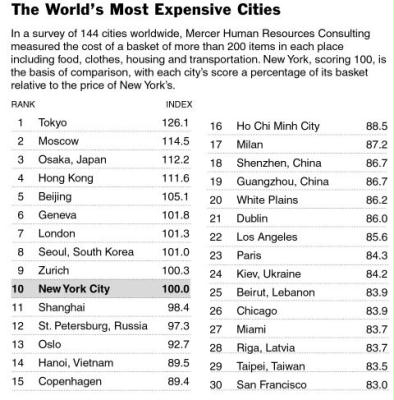A Strong Yen Helps Tokyo Retain Status as Most Costly

A Strong Yen Helps Tokyo Retain Status as Most Costly By JAMES BROOKE
TOKYO, June 16 <a href=www.nytimes.com>NYT— Defying notions about Japanese deflation, Tokyo is again the most expensive city in the world.
A 4 percent drop in the exchange value of the dollar against the Japanese yen helped keep Tokyo in first place and place Osaka third in an annual cost-of-living survey of 144 major world cities conducted in March by Mercer Human Resources Consulting of Geneva, a Marsh & McLennan company.
With cab fares starting at $5, $10,000-a-month rents for apartments not uncommon and intercity rail travel expensive, Tokyo residents notice the 1 percent annual deflation rate of prices in yen.
"Even though Japan is facing a deflationary situation, the yen appreciated against the dollar, which made the cost of living go up," Yvonne Traber, director of the survey, said from Geneva, which jumped to 6th place this year from 28th in 2002.
Last year, no European city was more costly than New York, which ranked in seventh place. But this year, with New York 10th, four European cities were more expensive — London, Zurich, Geneva and Moscow.
For Americans planning to travel abroad this summer, a drop in the dollar against the euro of around 20 percent has made European destinations significantly more expensive.
Oslo rose to 13th place from 40th last year; Copenhagen to 15th from 62nd; Milan to 17th place from 63rd; and Paris to 23rd from 74th.
"Italy went up drastically, and that really reflects the euro," Ms. Traber said. For the same reason, she noted, Dublin jumped to 21st place, from 73rd.
Of the nine cities more expensive than New York in the new rankings, five were Asian: besides Tokyo and Osaka, they were Hong Kong (4), Beijing (5) and Seoul (8).
Moscow, which has an extremely expensive housing market for foreigners, was the world's second most expensive city, unchanged from last year.
Hundreds of Americans, largely in finance and banking, are returning to the United States from Tokyo this summer, many of them ordered home by stateside executives who do not think that Japan's stagnant business climate is worth the high cost of maintaining employees there.
For those still in Tokyo, neither deflation nor a prospective softening in the housing market has helped much so far. Prices there were 26 percent higher than New York's.
Cities in Canada and South America ranked among the world's least expensive. Toronto, in 104th place, was 65 percent of New York's expense level, and Ottawa (127), 57 percent. Vancouver, Calgary and Montreal were in between.
Between Caracas, Venezuela (128), and Asunción, Paraguay (144), were Quito, Ecuador; São Paulo, Brazil; Rio de Janeiro; Montevideo, Uruguay; Buenos Aires; and Bogotá, Colombia.
Prices in the Brazilian cities were half those in New York. Asunción, a place with an air of a provincial capital, was the cheapest major city in the world, with prices only 36 percent of New York's.
In the South Pacific region, Sydney, Australia, was 67th, up from 39th in 2002, and Auckland and Wellington, New Zealand, rose to 115th and 117th, respectively.
The survey, conducted during the first 10 days of March, is based on the cost of more than 200 items, including housing, food, transportation and entertainment. Many big companies use the figures to adjust pay for their employees sent overseas.
Any costs of private schooling are not included.